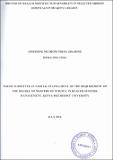| dc.description.abstract | Mission hospitals were initiated by missionaries and were heavily subsidized. The situation has changed; donor support is no longer reliable and cost of providing services has increased tremendously. The subsidy which enabled the services to be cheap and accessible has largely ceased hence the full cost of delivering services has to be met by the patients. A number of mission hospitals are befallen by crisis due to weak governance structures leading to poor oversight of health institutions. The health providers market has also become very competitive with private and public health units mushrooming in both urban and rural areas. Due to the financial constraints, sustainability of mission hospitals has been difficult and is in dire need of exploring other factors to enable it sustain health services. The study was conducted to explore drivers of health services' sustainability in mission hospitals so as to enhance service provision, accountability and growth while embracing best practices. The specific objectives were to find out if governance, continuous quality improvement and stakeholders engagement influence sustainability. The study was carried out in 10 faith based Hospitals in Kirinyaga, Murang'a, Embu, Nyeri and Meru counties with bed capacity of 60 and above. A descriptive cross sectional study design was used and a non-probability sampling method was used to select subjects of the study. Questionnaires and key informant interviews with selected chief executive officers was used to collect data that was analyzed using Statistical Package for Social Sciences and presented in the form of frequency tables at p < 0.05. A multivariate regression model was applied to determine the relative importance of each of the three variables with respect to Health Services' Sustainability. The study found out that mission hospital adheres to quality improvement practices such as presence of quality improvement teams and standard operating procedures but lacks top management support; they have a board of directors but lack a clear documented organization structure (organogram) while board composition was biased to church leaders. Study also indicated that stakeholder's engagement was a key drive to sustainability but there was little engagement within the catchment population. The study concluded that Mission hospitals lack sufficient funds from their sources of income to sustain quality health services since main source of funds is user fee which is also affected by dwindling patient numbers. The study recommends that Governance of mission hospitals should be strengthened and professionalized to ensure that it has the essential competence and Mix of skills and employees trained on sustainable procurement concept. It is recommended to further research on how mission hospitals can gain competitive advantage through service differentiation. | en_US |

